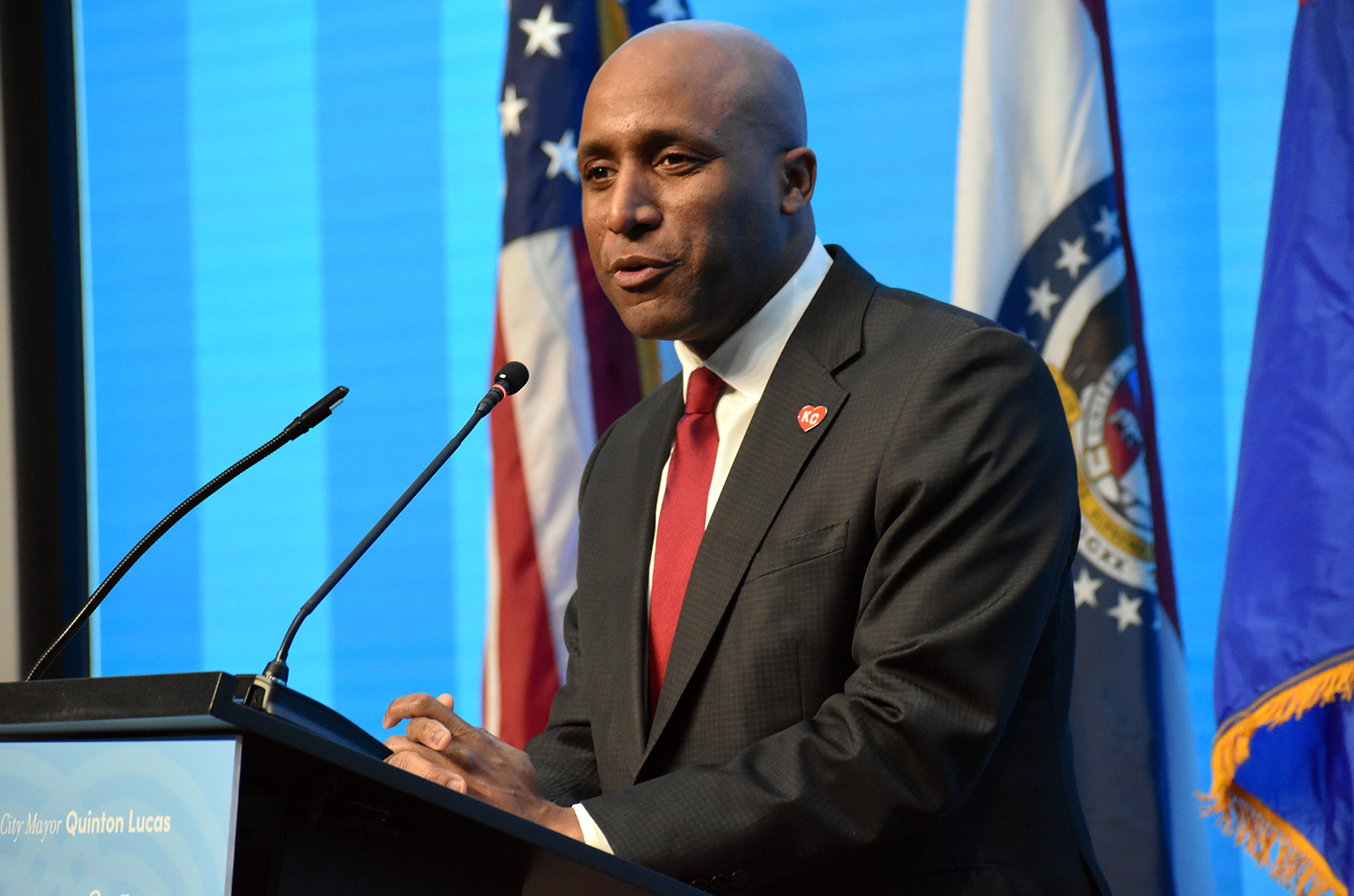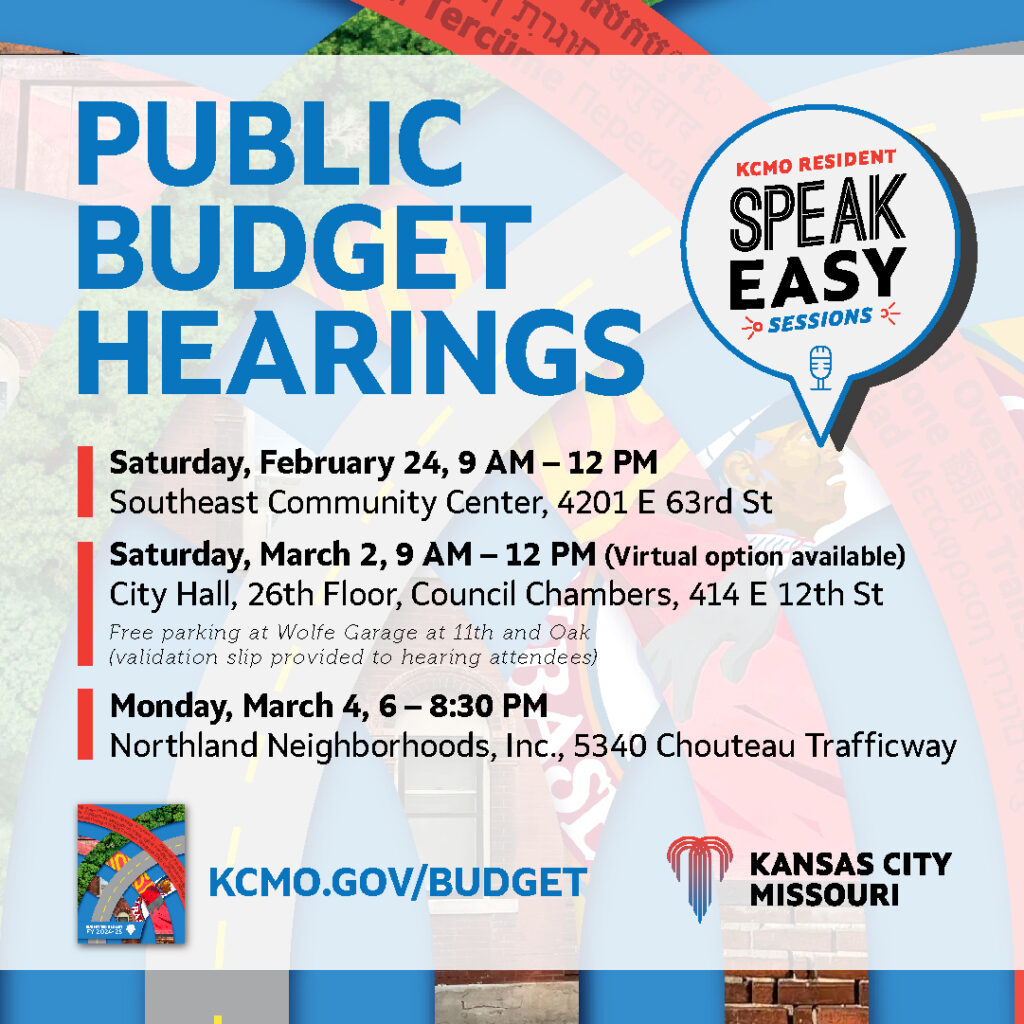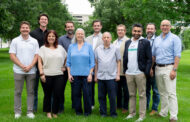Kansas City, Missouri, is its strongest fiscal position ever, said Mayor Quinton Lucas, emphasizing the city’s potential to capitalize on that economic stability — coupled with headline-grabbing national attention thanks to the Chiefs — to tackle a range of concerns facing entrepreneurs and workers.
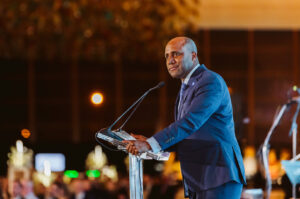
Mayor Quinton Lucas speaks to the crowd at a private celebration of KCI’s new airport terminal in February 2023; photo by Adri Guyer, PlatinumXP
Opportunities for investment, growth, redevelopment and crime prevention for small businesses are at the top of his agenda, Lucas said Wednesday during his State of the City address at the Children’s Mercy Research Institute.
“In this moment, Kansas City is on fire,” he said, laying out a string of 2023 victories for the city that helped set the stage for his vision. “The Kansas City International Airport Terminal opened ahead of time and on budget and we continue to break passenger records and add more flight destinations for travelers. Continuing a dream that seemed unimaginable for many of us who grew up in Kansas City, the Chiefs will play in the Super Bowl for a fourth time in five years this Sunday.”
“The eyes of the world will return to Kansas City this March, as the Kansas City Current bring a new and exceptional dedicated women’s professional sports facility to the Missouri River, cementing Kansas City’s role as a leader in sports access and equity for all,” he continued. “And in two years, Kansas City welcomes the world to town, hosting six [FIFA] World Cup matches, including one quarterfinal, bringing more investment, jobs, and visitors from around the world.”
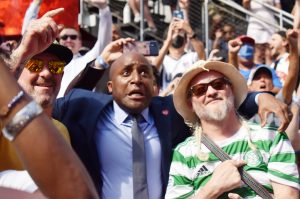
Kansas City Mayor Quinton Lucas reacts to news his city will host the 2026 World Cup during a June 2022 watch party event at Power & Light; photo by Channa Steinmetz, Startland News
Lucas then called for increased support for small and local businesses to coincide with the influx of activity.
““The upcoming budget also provides funding once more to support small businesses and incentives for restaurants as we approach major events in the years ahead and restaurants look to expand seating capacity, add patio spaces, and make permanent many of the changes in outdoor dining seen in recent years,” said Lucas.
The Fiscal Year 24-25 Budget is expected to be formally presented to the KCMO City Council Thursday during Business Session, followed by several upcoming public budget hearings to provide Kansas Citians an opportunity to weigh in.
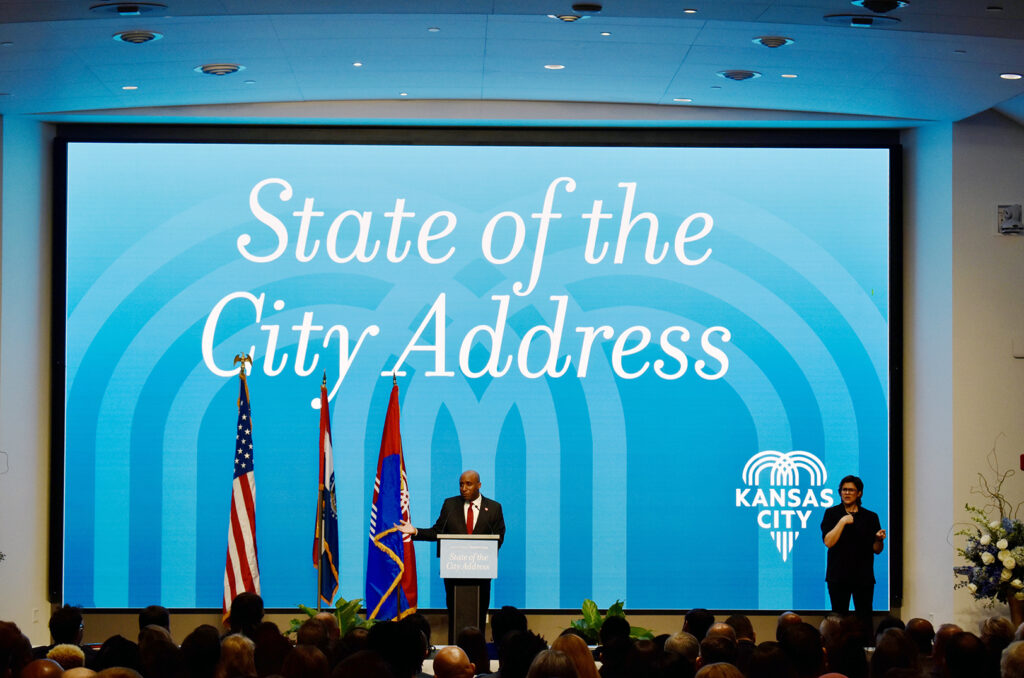
Kansas City Mayor Quinton Lucas speaks during the 2024 State of the City address; photo by Nikki Overfelt Chifalu, Startland News
New fountain of attraction
With a new spotlight on Kansas City comes greater responsibility, Lucas said, noting the city already has made great strides to accommodate new waves of visitors.

Kansas City Chiefs quarterback Patrick Mahomes celebrates amid the team’s 2023 championship parade; photo by Tommy Felts, Startland News
“Events, large and small, make a financial difference for Kansas City,” he said. “In the past year, Kansas City sold more than three million hotel room nights, generating more than $450 million in total room revenue to Kansas City businesses.”
The next step, Lucas added, is continuing to attract new talent from across the country — in part, by increasing language access in translating city services, documents, and meetings to draw more international appeal to the city.
“Our next budget addresses not only language access, but also ways we can ensure that those arriving anew in our community and perhaps our country can find work, education, and healthcare resources that will help them succeed while here,” he said.
Lucas highlighted such accomplishments as Kansas City’s recognition as a biotech “Tech Hub,” securing more than $75 million in federal funding and boosting job creation.
ICYMI: KC officially earns title of ‘Tech Hub,’ opening door to massive federal grant funding
“Opportunities like this one create thousands of high-paying jobs for our community in a growing industry,” Lucas said.
He also praised the effectiveness of his new Small Business Task Force in cultivating an inclusive and fair entrepreneurial environment.
“We are committed to breaking down common barriers that are preventing small businesses from succeeding and ways the city can help — or simply get out of the way,” he said.
RELATED: Mayor appoints city’s first Small Business Task Force as investment in KC entrepreneurs
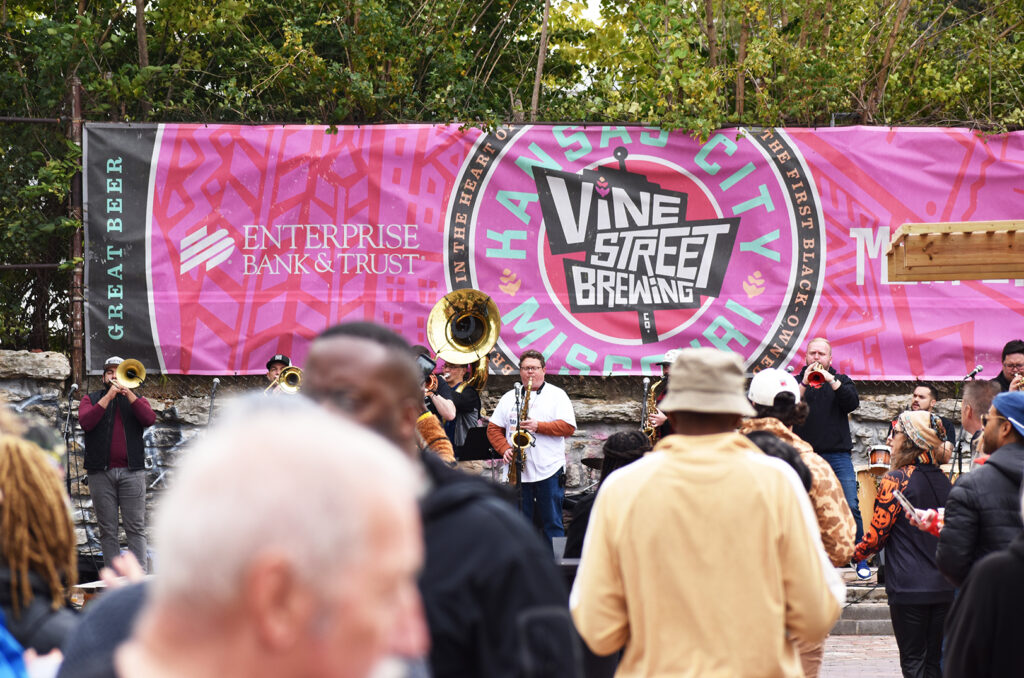
The Back Alley Brass Band performs behind Vine Street Brewing in the outdoor courtyard of 2000 Vine during the Prospect KC’s 2023 Gumbo Fest event; photo by Tommy Felts, Startland News
Developing underserved areas
Lucas used Wednesday’s address to outline a comprehensive plan for development in Kansas City, focusing on equitable growth across all areas, particularly in historically underserved communities like Kansas City’s east side.
“We can make sure that our growth and development touches all areas of the City, particular areas of east Kansas City where we have traditionally done far too little,” he said.
The mayor pointed to the 18th and Vine Jazz District as a prime example of progress, mentioning the 2000 Vine project, which welcomed new businesses, including Missouri’s first Black-owned brewery, and the One Nine Vine Project, providing hundreds of units of mixed-income housing.
Moving south, Lucas referenced the 63rd and Prospect Southpointe development, signaling a new era of growth for southeast Kansas City.
“Most Kansas Citians under the age of 40 cannot remember a time when there has been development or even a physical structure at the northwest corner of 63rd and Prospect or new development on one of the most important arteries in our city between 55th and 63rd Streets,” he said. “The next several years will usher in new housing, a hotel, and office development for southeast Kansas City in areas that have been overlooked for far too long.”
“Before my term is done, we will see a new day in southeast Kansas City,” Lucas added.
But development doesn’t just mean building new structures, he emphasized.
The mayor highlighted the city’s tree-planting initiative, aiming to plant 10,000 trees by 2027 with the assistance of a $12 million grant to improve environmental quality across all neighborhoods. Another $1 million in committed funds is expected to be dedicated to mitigating lead in soils of vacant properties in the Ivanhoe neighborhood and to prepare the properties for use as infill housing.
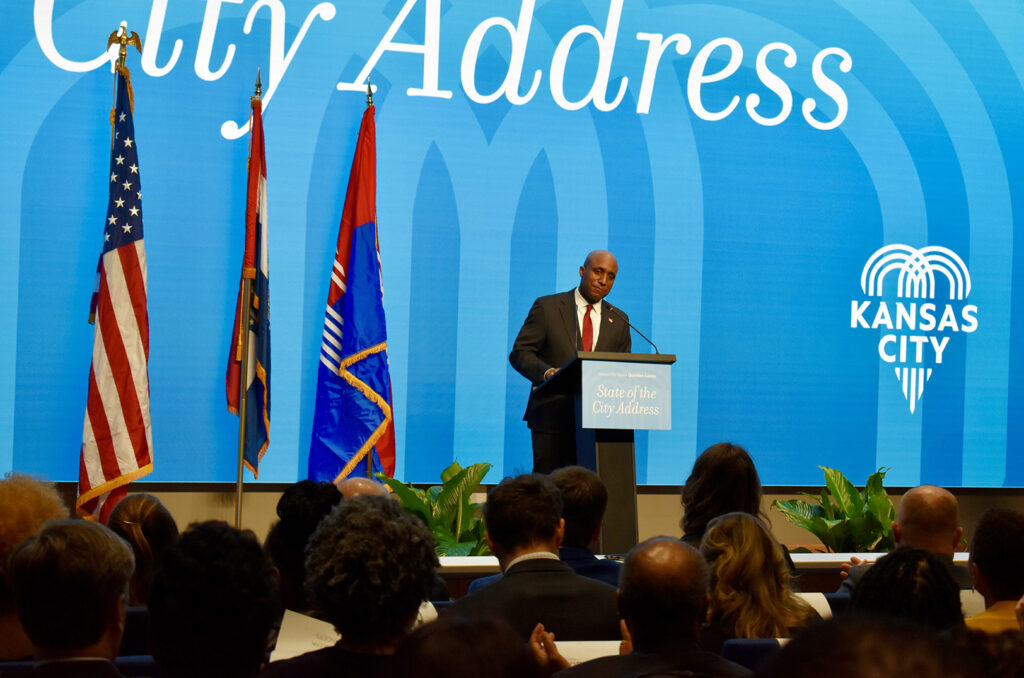
Kansas City Mayor Quinton Lucas speaks during the 2024 State of the City address; photo by Nikki Overfelt Chifalu, Startland News
Crime prevention
In a community that has improved in almost every measurable way since 2020, Lucas said, violence remains Kansas City’s greatest challenge.
“I talked to a business owner about public safety and we talked about what we could do: ‘Was it the guns? Was it the number of police? Was it early intervention programs for our young people?’” Lucas recalled. “She had the right answer — it was all of the above.”
Lucas proposed allocating $7 million from the city’s upcoming budget for violence intervention and prevention, he said.
Additionally, the mayor advocated for fully funding the police department and a 30-percent pay raise for officers, increasing their starting salary from $50,000 to $65,000. Lucas stressed the importance of adequate police presence, efficient emergency services, and support for crisis intervention.
“We have to have enough police in this city,” he said. “We have to have call takers who answer 911 when our residents call. We have to have services for those in crisis.”
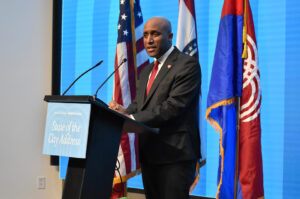
Kansas City Mayor Quinton Lucas speaks during the 2024 State of the City address; photo by Taylor Wilmore, Startland News
And Kansas Citians must show themselves to be adults who can demonstrate how to solve disputes without violence, Lucas said, showing a path of collaboration instead.
“I sometimes joke with a heavy dose of truth that the February Chiefs Super Bowl Parade is the last thing from 2020 I like to remember,” he said. “After that point, through pandemic and protests, we saw battle lines form that for years after defined how we would respond to our homicide epidemic in Kansas City and in other American cities. What many along the way forgot was that we are all on the same side.”
“I never want to go to the funeral of a teenage murder victim again. Our police never want to work a preventable scene of tragedy again,” Lucas continued. “We all want our families to be safe during a day out in Kansas City. Lawlessness and shoot-outs in the heart of our city have no justification and will never be tolerated.”



